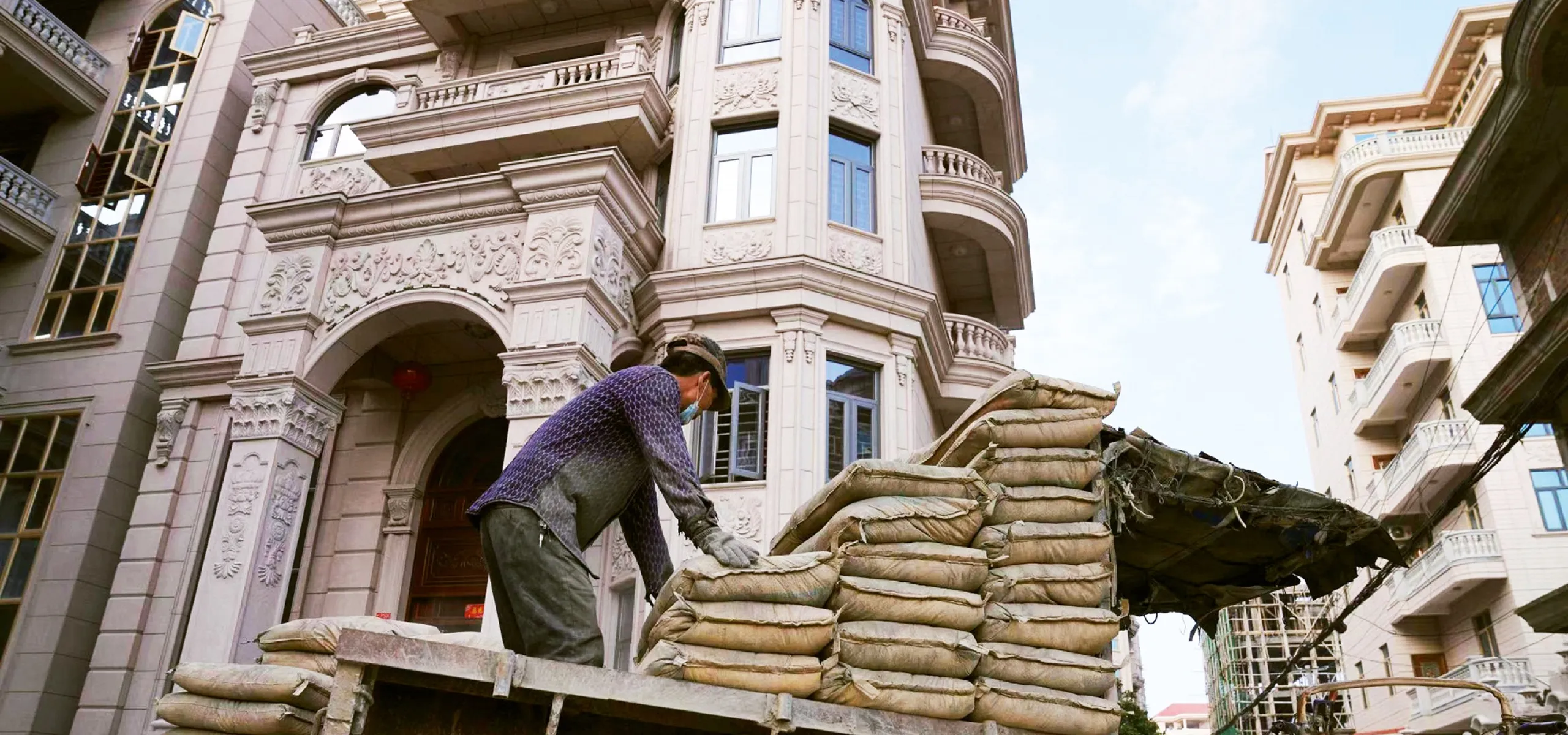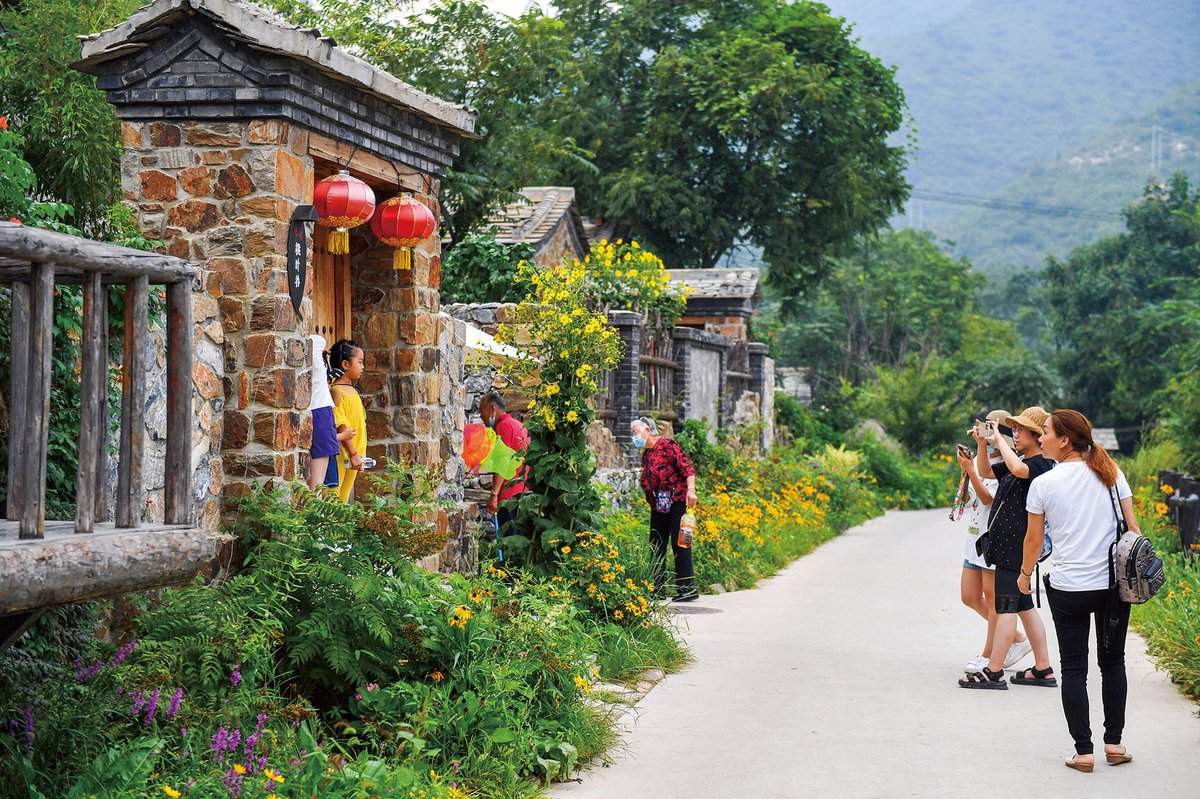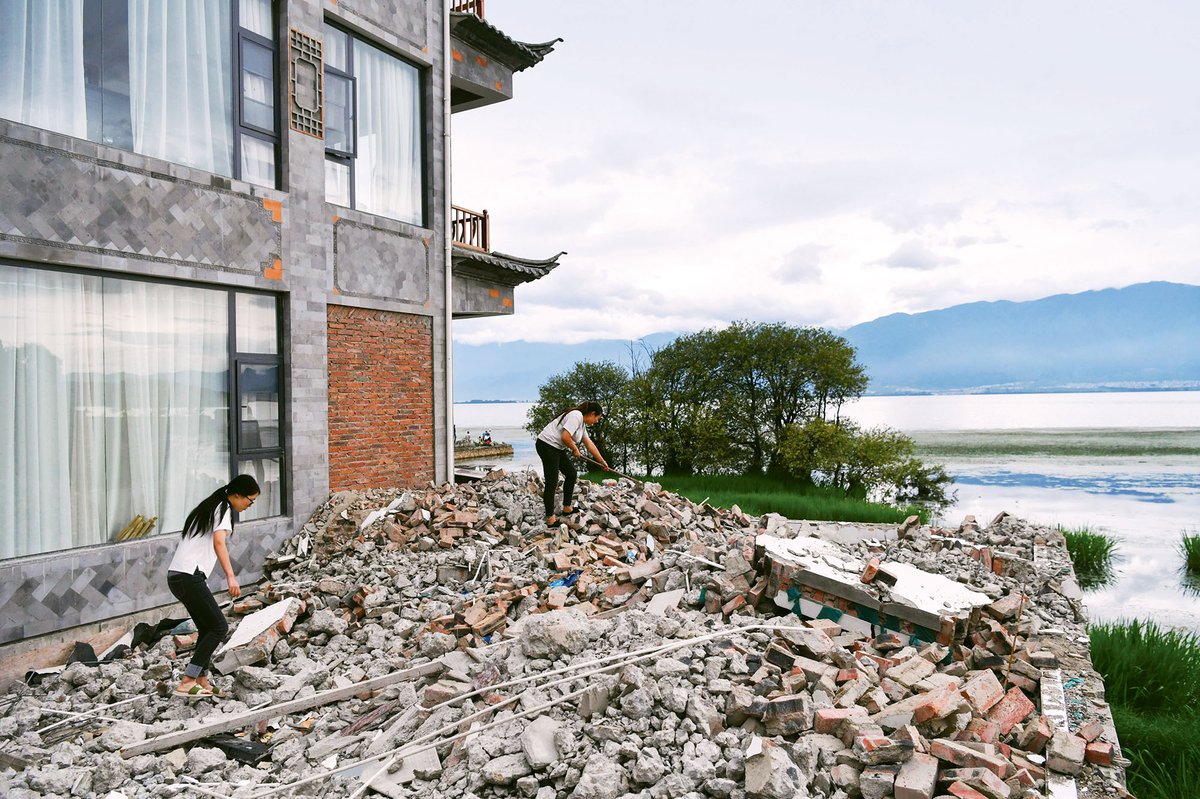China’s rural land is seeing a building boom as villagers exercise their homestead rights—but is it sustainable?
Every weekend, a mere one-hour drive from downtown Chengdu takes Ye Zi and her husband to an alluring mansion of over 200 square meters in Sichuan province, where they live an envious life: chatting with friends under a grapefruit tree, feeding fish in the pond, cooking barbecue in the yard, or just lounging in the beautiful rural surroundings. But this isn’t another “influencer” guesthouse catering to urbanites in a remote village—it’s Ye’s home.
Ye, a 30-year-old engineer who owns an apartment in Chengdu, decided to renovate her family’s ancestral home last September to turn it into a more comfortable space for her aging parents, who haven’t been able to adapt to urban life. “[Our apartment in Chengdu] is less than a hundred square meters. When we close the door, there is no more space for other activities,” explains Ye. “Everyone’s lives are separated; our neighbors don’t know one another.”
As of the end of 2019, China had more than 11 million hectares of “homestead land,” or zhaijidi (宅基地), which is rural land reserved for housing construction. Though a growing number of people are flocking to cities, leaving farmlands empty or repurposed for industry and government construction, there are signs that rural homestead land is coming back to life.
An article last December from the China Report on Agriculture, Rural Areas and Rural Residents, a publication under the Ministry of Agriculture, revealed that while the number of rural permanent residents dropped from 808 million in 2000 to 564 million in 2018, rural housing has grown from over 1.95 million hectares to 2.52 million hectares during that period. Reasons cited include high housing prices in cities, lack of social security and public services, as well as discriminatory education in cities.
The rural construction boom in the last two decades can also be partly explained by the traditional notion of “fallen leaves returning to roots”: the idea that no matter how far a person travels from home, they are obligated to return there before they die. Hundreds of millions of migrant workers from rural regions may spend their entire working lives in cities, yet build a home on their family’s homestead plot for eventual retirement, even if they have to leave the house empty until then. According to a report by the Chinese Academy of Social Sciences’ Rural Development Institute, around 10.7 percent of rural homesteads stood empty as of 2018—about 25 million homes.
Other traditional notions, such as a “face” culture that pressures residents of the village to show off their achievements in the cities by ostentatious home improvements, and the need to build a home for one’s sons before they marry, also play a role. In addition, for rural families without many assets, a house may be their only collateral for securing a loan. There’s also some time pressure: Before building the house on village land, which is collectively owned, rural residents need to apply for homestead rights from the village itself, which can be rescinded for a variety of reasons including if the applicant leaves the land unused for over two years.
This year, deputy secretary Zhao Lin in Shuangshi village, Sichuan, received about 70 applications for homestead rights. Half of them have been approved. To get approval to build in Zhao’s village, residents need sign-off from two-thirds of the village collective’s members, as well as confirmation from the local department of natural resources that the land will not take up farmland. The applicant also has to get approval from local planning officials on the size, number of stories, and design aesthetic of the house in a process that could take as little as a week or up to three months.
With land becoming more valuable, and migration changing the social cohesion of the village, land disputes have emerged in rural areas. Last year, a three-year-long dispute between neighbors in a village in Putian, Fujian, ended in tragedy when 55-year-old Ou Jinzhong killed two people and injured three more, including two toddlers, in the family next door, then went on the run for a week before committing suicide. The victims’ family had refused to sign off on Ou’s request to rebuild his house after he’d already torn the original house down, and harassed him whenever he tried to start construction, forcing him and his 89-year-old mother to live in a tin shack.
Empty rural housing has attracted investment from outside the villages, which also leads to debate on who ultimately benefits from rural property. In Zhao’s village, there is one house that has been turned into a restaurant by an “outsider.” Zhao believes it helps boost rural development: “When tourists come, they will have more places to go, which could also drive traffic and improve our village’s amenities,” he says.
In southern Anhui province, guesthouse owner Ninglin, who wanted to be identified by just her first name, agrees. “Milan and Shanghai may not need another luxury store, but just one high-end hotel can boost my hometown’s amenities,” she says. The 35-year-old worked as a designer in Shanghai before returning to her hometown in 2018 to take care of her newborn daughter, replacing the earthen-walled farmhouse that was her childhood home with a multi-level guesthouse of tile and stone, which opened for business in 2019.
Since then, around a dozen hotels and guesthouses have opened in the village, which Ninglin believes improves the appearance of the surrounding community. “Some residents will consult us when they want to renovate their house,” she says. “Instead of traditional farmhouses, we now have [houses] with clean yards and flowers, and roads are much cleaner than before and therefore better for receiving tourists.”
Ninglin believes rural hotels are critical to local development. “In most villages across the country, you’ll only find elderly people, but you can’t rely on them to boost the local economy. Rural hotels let people know the village’s existence,” she says. “A lot of rural areas are beautiful, but no one knows about them or goes to them, or if they do go there are no appropriate facilities or accommodation for tourists.” She believes better amenities and business opportunities can also attract young people back into the villages, where most are reluctant to live despite hardships in the city due to a lack of economic and entertainment options.
Lai Wenbo, professor of South China University of Technology, tells TWOC “agritainment”—rural hotels, campsites, and other ways of commercializing homestead rights—is being seized on by village governments and homesteaders themselves as easy ways to make rural areas more dynamic.
The rural construction boom has also brought safety hazards however. Traditionally, homes in the countryside are designed and built by the family themselves, often with the extended family and neighbors pitching in, with little understanding of safety standards, permits, or efficient design. In April, 53 people died when an eight-story “self-built” housing block collapsed in a town outside Changsha, Hunan province, triggered by the illegal addition of extra floors. In 2020, a two-story restaurant in a village in Shanxi province collapsed, injuring 28 people and killing 29, due to structural changes from several illegal expansions of the original building.
Aiming to prevent similar tragedies, the Ministry of Housing and Urban-Rural Development has investigated about 224 million self-constructed structures in 500,000 villages since 2020 and issued notifications to rectify potential hazards. Last December, the Ministry issued guidelines on the safe construction of rural housing and to date has trained more than 40,000 village construction workers in skills and safety awareness.
Villagers aren’t always cooperative with such efforts. Those with an emotional attachment to their land, or inherited homes from their ancestors, are often reluctant to demolish illegal buildings or rectify their homes according to new standards. Zhao remembers that in August, it took him about two weeks to convince an elderly couple to knock down their illegal construction that exceeded the local homestead standard of 150 square meters, and he had to enlist several influential village elders’ help. “They just stayed inside the house and said, ‘If you knock down the house, you have to bury us in it,’” he recalls.
Zhao estimates that 80 percent of households in his village have taken up more than the local standard of 150 square meters to build their homes. Rather than persuade residents to demolish all of them, they’ve resorted to collecting additional fees for those who exceed their allotted area. “Before they built houses, no one told them [the rules] since the regulations weren’t enforced, and few village officials understood the rules themselves,” he admits. “As long as you were a resident of our village, you could build your house as you wanted.”
Emerging village “agri-businesses” and the construction frenzy they created have other downsides, such as an impact on the fragile infrastructure and natural environment of the village. In 2019, the local government took drastic measures to shut down 1,806 guesthouses, restaurants, and hotels around Erhai Lake in Yunnan province, due to signs of worsening water quality and large outbreaks of toxic blue-green algae. Similarly, in 2019, thousands of agritainment sites around Yangcheng Lake were revealed to be in contravention of sewage treatment regulations.
Some developments are gradually becoming more eco-conscious. Ninglin has installed oil separators and septic tanks for sewage treatment, and her city, Ningguo, has invested over 2.3 million yuan in building sewage treatment facilities and garbage transfer stations in several towns for environmental protection. Lai, who also runs an agritainment business in Huanghua town, Guangdong province, has built a campsite on stilts to reduce damage to the soil, used local construction materials, and retained the natural land with gravel instead of paving it over with concrete.
He believes that the environmental issues caused by agritainment are due to the fact that China’s rural areas still lack sanitation services and public facilities on a par with the cities, forcing people to use diesel for electricity and adopt other inefficient methods. He suggests local governments introduce favorable policies for eco-conscious businesses. “If your guesthouse processes one ton of waste water, then [the government] can cut your [sewage treatment] fees accordingly,” he explains. “Or if your guesthouse does well in sewage treatment and other environmental aspects, then they can reduce some taxes.”
Lai also hopes villagers can get a stake in the building boom, and that it can improve local living standards as a whole. “What we bring [to the village] should make local infrastructure better, and provide rural residents better services like medical care and education, and provide jobs, rather than just occupying and plundering their ecological resources and taking away the money made here,” he says. One of his initiatives in Huanghua town invites college students for a seven-day workshop to provide villagers advice on craftsmanship, safety assessment of their buildings, and various design proposals.
He also plans to transform his own home in rural Hunan province into a non-profit public space, like a senior center or library, which many villages lack. “The most important memories of my life come from village,” he says. “If you improve the condition of a building, you might as well let others use it. Space is only valuable when people begin to use it.”
Paving Paradise: Behind China’s Rural Building Boom is a story from our issue, “Promised Land.” To read the entire issue, become a subscriber and receive the full magazine.














